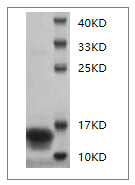| Product name | Mouse IFN-γ protein, His Tag |
| Sequence | Amino acid sequence derived from Mouse IFN-γ protein soluble form (NP_P01580) (His23-Cys155) was expressed, was expressed with a polyhistidine tag at the N-terminus. |
| Activity | Immobilized Mouse IFN-γ protein at 1 μg/mL (100 μl/well) can bind Mouse IFNGR1, The EC50 of Mouse IFNGR1 is 144 ng/mL;Measured by a cytotoxicity assay using TF-1 Cells. The ED50 for this effect is 0.03279 ng/mL ng/mL. |
| Protein length | The recombinant Mouse IFN-γ protein consists of 154 amino acids and predicts a molecular mass of 16.9 kDa. |
| Preparation method | E. coli |
| Purity | > 95 % as determined by SDS-PAGE |
| Alternative | IFG; IFI; IFN gamma; Interferon Gamma; Interferon gamma; IFNG |
| Formulation | Lyophilized from sterile 150mM NaCl 20mM Tris , pH 8.0. |
| Molecular weight | 16.9 kDa |
| Usage notes | Always centrifuge tubes before opening. It is recommended to reconstitute the lyophilized Mouse IFN-gamma protein in sterile ddH2O not less than 100µg/ml, which can then be further diluted to other aqueous solutions. |
| Storage instructions | Lyophilized Mouse IFN-γ protein, His Tagshould be stored desiccated below -20°C. Upon reconstitution, the protein should be stored at 4°C between 2-7 days and for future use below -20°C. For long term storage it is recommended to add a carrier protein (0.6% HSA or BSA). Please prevent freeze-thaw cycles. |
| Shipping | The product is shipped at ambient temperature. |
| Precautions | The product listed herein is for research use only and is not intended for use in human or clinical diagnosis. Suggested applications of our products are not recommendations to use our products in violation of any patent or as a license. We cannot be responsible for patent infringements or other violations that may occur with the use of this product. |
| Background | IFN-γ, also known as IFNG, is a secreted protein which belongs to the type I I interferon family. IFN-γ is produced predominantly by natural killer and natural killer T cells as part of the innate immune response, and by CD4 and CD8 cytotoxic T lymphocyte effector T cells once antigen-specific immunity develops. IFN-γ has antiviral, immunoregulatory, and anti-tumor properties. IFNG, in addition to having antiviral activity, has important immunoregulatory functions, it is a potent activator of macrophages, and has antiproliferative effects on transformed cells and it can potentiate the antiviral and antitumor effects of the type I interferons. The IFNG monomer consists of a core of six α-helices and an extended unfolded sequence in the C-terminal region. IFN-γ is critical for innate and adaptive immunity against viral and intracellular bacterial infections and for tumor control. Aberrant IFN-γ expression is associated with a number of autoinflammatory and autoimmune diseases. The importance of IFN-γ in the immune system stems in part from its ability to inhibit viral replication directly, and most importantly from its immunostimulatory and immunomodulatory effects. IFNG also promotes NK cell activity. |
| Gene ID | 15978 |
| Alternative | IFG; IFI; IFN gamma; Interferon Gamma; Interferon gamma; IFNG |
| Accession | P01580 |

Fig.SDS-PAGE analysis of Mouse IFN-gamma protein.
Author:Luo J, Wang J, Zhang J, et al. Publication name:Cells IF:7.666
You must be logged in to post a review.
Reviews
There are no reviews yet.